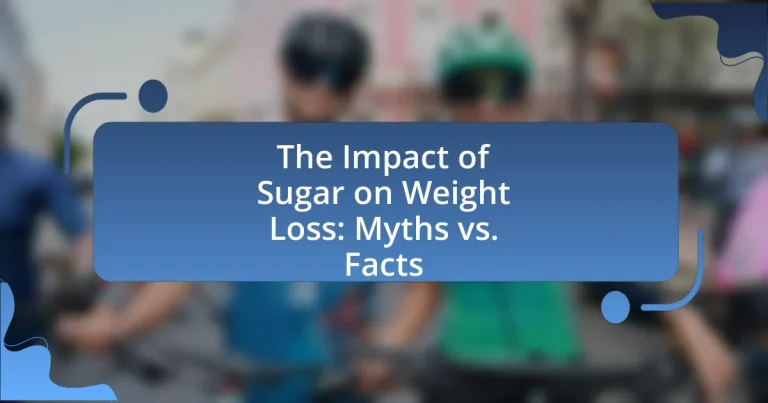The article examines the relationship between sugar consumption and weight loss, highlighting how high sugar intake can impede weight loss efforts by increasing calorie consumption and promoting fat storage, particularly in the abdominal area. It discusses the different types of sugars commonly consumed, their varying impacts on the body, and common myths surrounding sugar and weight gain. The article also addresses the psychological effects of sugar, strategies for managing sugar intake, and the importance of understanding food labels to make informed dietary choices. Overall, it emphasizes the need for moderation in sugar consumption as part of a balanced diet to support effective weight management.

What is the relationship between sugar and weight loss?
The relationship between sugar and weight loss is that high sugar intake can hinder weight loss efforts. Consuming excessive sugar leads to increased calorie intake and can promote fat storage, particularly in the abdominal area. Studies indicate that diets high in added sugars are linked to obesity and metabolic issues, as sugar can trigger insulin spikes that encourage fat accumulation. For instance, research published in the American Journal of Clinical Nutrition found that individuals consuming high-sugar diets had a higher risk of weight gain compared to those with lower sugar intake. Thus, reducing sugar consumption is often recommended for effective weight loss.
How does sugar consumption affect weight management?
Sugar consumption negatively affects weight management by contributing to increased calorie intake and promoting fat storage. High sugar intake, particularly from sugary beverages and processed foods, leads to excess energy consumption without providing satiety, which can result in weight gain. Research indicates that diets high in added sugars are associated with higher body mass index (BMI) and obesity rates. For instance, a study published in the American Journal of Clinical Nutrition found that each additional serving of sugar-sweetened beverages per day was linked to a 0.08 kg increase in weight over a year. This evidence underscores the role of sugar in disrupting energy balance and hindering effective weight management.
What types of sugar are most commonly consumed?
The most commonly consumed types of sugar are sucrose, fructose, and glucose. Sucrose, often referred to as table sugar, is derived from sugar cane or sugar beets and is widely used in various food products. Fructose, found naturally in fruits and honey, is frequently added to processed foods in the form of high-fructose corn syrup. Glucose, a simple sugar, is a primary energy source for the body and is present in many carbohydrates. According to the U.S. Department of Agriculture, the average American consumes about 152 pounds of sugar annually, with a significant portion coming from these types.
How do different sugars impact the body differently?
Different sugars impact the body in various ways due to their chemical structures and how they are metabolized. For instance, glucose is rapidly absorbed into the bloodstream, leading to a quick spike in blood sugar levels, which can trigger insulin release and promote fat storage. In contrast, fructose is metabolized primarily in the liver, where it can be converted into fat more readily, contributing to increased fat accumulation and potential insulin resistance over time. Research indicates that excessive fructose consumption is linked to obesity and metabolic syndrome, as shown in a study published in the American Journal of Clinical Nutrition, which found that high fructose intake is associated with increased visceral fat. Additionally, sucrose, which is a combination of glucose and fructose, can have similar effects as both sugars, leading to weight gain and other health issues when consumed in excess.
What are common myths about sugar and weight loss?
Common myths about sugar and weight loss include the belief that all sugar is equally harmful and that eliminating sugar entirely guarantees weight loss. While excessive consumption of added sugars can contribute to weight gain, natural sugars found in fruits and vegetables are not inherently fattening and provide essential nutrients. Additionally, research indicates that weight loss is primarily influenced by overall caloric intake and expenditure rather than sugar alone. A study published in the American Journal of Clinical Nutrition found that reducing overall calorie intake, regardless of sugar content, is key to effective weight loss.
Why do people believe that sugar is the sole cause of weight gain?
People believe that sugar is the sole cause of weight gain primarily due to its high caloric content and its rapid impact on blood glucose levels. When consumed, sugar can lead to increased insulin production, which promotes fat storage in the body. Research indicates that diets high in added sugars, particularly from sugary beverages, are associated with higher body weight and obesity rates. For instance, a study published in the American Journal of Clinical Nutrition found that each additional serving of sugar-sweetened beverages per day was linked to a 0.6 kg increase in body weight over time. This direct correlation between sugar intake and weight gain reinforces the perception that sugar is a primary culprit in obesity.
How does misinformation about sugar affect dietary choices?
Misinformation about sugar significantly influences dietary choices by leading individuals to avoid beneficial foods or consume unhealthy alternatives. For instance, many people mistakenly believe that all sugars are harmful, prompting them to eliminate fruits, which contain natural sugars along with essential nutrients and fiber. This misperception can result in a diet lacking in vital vitamins and minerals, ultimately affecting overall health. Research indicates that misinformation can lead to increased consumption of processed foods marketed as “sugar-free,” which often contain unhealthy substitutes like artificial sweeteners that may have adverse health effects. Therefore, the spread of inaccurate information about sugar can distort dietary habits, leading to poorer nutritional outcomes.
What scientific facts support or refute these myths?
Scientific facts refute the myth that sugar alone causes weight gain. Research indicates that weight gain is primarily influenced by overall caloric intake and energy expenditure rather than sugar consumption in isolation. A study published in the American Journal of Clinical Nutrition found that when total caloric intake is controlled, the type of carbohydrate, including sugar, does not significantly affect weight gain. Additionally, the World Health Organization recommends limiting free sugars to less than 10% of total energy intake, emphasizing moderation rather than complete avoidance. This evidence supports the understanding that sugar, when consumed within a balanced diet, does not inherently lead to weight gain.
What studies have been conducted on sugar and weight loss?
Numerous studies have investigated the relationship between sugar consumption and weight loss, revealing that high sugar intake is often linked to weight gain rather than loss. For instance, a study published in the American Journal of Clinical Nutrition by George A. Bray and Samara Joy Nielsen in 2010 found that increased consumption of sugar-sweetened beverages correlates with higher body weight and obesity rates. Another significant study by G. A. R. de Ruyter et al. in 2012, published in the New England Journal of Medicine, demonstrated that reducing sugar-sweetened beverage intake led to weight loss in children. These studies collectively indicate that excessive sugar intake can hinder weight loss efforts and contribute to obesity.
How do experts view the role of sugar in a balanced diet?
Experts view sugar as a component that should be consumed in moderation within a balanced diet. They recognize that while sugar provides a quick source of energy, excessive intake can lead to health issues such as obesity, diabetes, and heart disease. The American Heart Association recommends limiting added sugars to no more than 6% of daily caloric intake, which supports the idea that moderation is key for maintaining overall health.
How can understanding sugar’s impact aid in effective weight loss?
Understanding sugar’s impact can significantly aid in effective weight loss by enabling individuals to make informed dietary choices that reduce calorie intake and improve metabolic health. Research indicates that high sugar consumption, particularly from added sugars and sugary beverages, is linked to increased body fat and obesity, as these sugars provide empty calories without nutritional benefits. For instance, a study published in the American Journal of Clinical Nutrition found that reducing sugar intake led to a decrease in body weight and fat mass among participants. By recognizing the effects of sugar on hunger and satiety hormones, individuals can better manage cravings and avoid overeating, ultimately supporting their weight loss goals.
What strategies can be employed to manage sugar intake?
To manage sugar intake, individuals can implement several effective strategies. First, they can read food labels to identify added sugars, as many processed foods contain high levels of sugar that may not be immediately obvious. For instance, the American Heart Association recommends limiting added sugars to no more than 6 teaspoons per day for women and 9 teaspoons for men. Additionally, individuals can opt for whole foods, such as fruits, vegetables, and whole grains, which naturally contain less sugar and provide essential nutrients. Another strategy is to reduce sugary beverages, as drinks like soda and sweetened coffee can significantly contribute to daily sugar intake. Research indicates that cutting out sugary drinks can lead to weight loss and improved health outcomes. Lastly, meal planning and preparation can help individuals avoid impulsive choices that may include high-sugar options, promoting healthier eating habits overall.
How can one identify hidden sugars in foods?
To identify hidden sugars in foods, one should carefully read food labels, focusing on the ingredient list where sugars can be listed under various names such as sucrose, glucose, fructose, and corn syrup. The American Heart Association states that added sugars can be found in many processed foods, even those marketed as healthy, making label scrutiny essential for accurate identification. Additionally, checking the nutrition facts panel for total sugars and added sugars can provide clarity on the sugar content, as the FDA requires this information to be clearly stated.
What are healthier alternatives to high-sugar foods?
Healthier alternatives to high-sugar foods include fruits, nuts, yogurt, and whole grains. Fruits like berries and apples provide natural sweetness along with fiber and vitamins, making them a nutritious choice. Nuts offer healthy fats and protein, which can help satisfy cravings without the added sugars found in many snacks. Unsweetened yogurt serves as a low-sugar option that is rich in probiotics and calcium, while whole grains such as oats and quinoa provide complex carbohydrates that stabilize blood sugar levels. These alternatives not only reduce sugar intake but also contribute essential nutrients to the diet, supporting overall health and weight management.
What role does sugar play in cravings and appetite regulation?
Sugar significantly influences cravings and appetite regulation by affecting the brain’s reward system and hormone levels. When consumed, sugar triggers the release of dopamine, a neurotransmitter associated with pleasure, which can lead to increased cravings for more sugary foods. Additionally, sugar intake can cause fluctuations in insulin levels, which may result in rapid changes in hunger and satiety signals. Research indicates that high sugar consumption is linked to increased appetite and a preference for high-calorie foods, contributing to overeating and potential weight gain. For instance, a study published in the American Journal of Clinical Nutrition found that participants consuming high-sugar diets reported greater hunger and cravings compared to those on lower-sugar diets.
How does sugar affect insulin levels and fat storage?
Sugar significantly increases insulin levels, which in turn promotes fat storage in the body. When sugar is consumed, it is rapidly absorbed into the bloodstream, leading to a spike in blood glucose levels. In response, the pancreas secretes insulin to help cells absorb glucose for energy or storage. Elevated insulin levels inhibit the breakdown of fat and encourage the storage of excess glucose as fat, particularly in adipose tissue. Research indicates that high sugar intake is linked to increased insulin resistance, which further exacerbates fat accumulation and can lead to obesity and metabolic disorders.
What psychological factors are influenced by sugar consumption?
Sugar consumption influences several psychological factors, including mood, cravings, and cognitive function. Research indicates that high sugar intake can lead to increased feelings of anxiety and depression, as it affects neurotransmitter levels, particularly serotonin. Additionally, sugar can create a cycle of cravings and reward-seeking behavior, as it activates the brain’s reward system, similar to addictive substances. A study published in the American Journal of Clinical Nutrition found that individuals consuming high amounts of sugar reported higher levels of mood disturbances. Furthermore, excessive sugar intake can impair cognitive function, leading to difficulties in attention and memory, as evidenced by research from the University of California, Los Angeles, which demonstrated that a high-sugar diet negatively impacts learning and memory in animal models.

What practical tips can help in managing sugar for weight loss?
To manage sugar effectively for weight loss, individuals should focus on reducing added sugars in their diet. This can be achieved by reading food labels to identify hidden sugars, opting for whole foods like fruits and vegetables instead of processed snacks, and using natural sweeteners like stevia or monk fruit in moderation. Research indicates that high sugar intake is linked to increased body weight and obesity, as evidenced by a study published in the American Journal of Clinical Nutrition, which found that reducing sugar intake can lead to significant weight loss. Additionally, maintaining a balanced diet rich in protein and fiber can help stabilize blood sugar levels, further supporting weight loss efforts.
How can meal planning assist in reducing sugar intake?
Meal planning assists in reducing sugar intake by allowing individuals to prepare balanced meals in advance, which minimizes the likelihood of impulsive, high-sugar food choices. By organizing meals, individuals can ensure they include whole foods, such as fruits, vegetables, and whole grains, while avoiding processed foods that often contain added sugars. Research indicates that meal planning can lead to healthier eating patterns, as individuals who plan their meals are more likely to consume fewer sugary snacks and beverages. A study published in the Journal of Nutrition Education and Behavior found that meal planning is associated with lower sugar consumption and improved dietary quality, demonstrating its effectiveness in managing sugar intake.
What are some effective meal prep strategies to limit sugar?
Effective meal prep strategies to limit sugar include planning meals around whole, unprocessed foods, using natural sweeteners in moderation, and reading labels to avoid added sugars. By focusing on whole foods like vegetables, lean proteins, and whole grains, individuals can significantly reduce their sugar intake. Research indicates that processed foods often contain hidden sugars, making label reading essential; for example, the American Heart Association recommends limiting added sugars to no more than 6% of daily caloric intake. Additionally, incorporating meal prep techniques such as batch cooking and portion control can help maintain consistent dietary choices that align with low-sugar goals.
How can one create a balanced diet that minimizes sugar?
To create a balanced diet that minimizes sugar, one should focus on whole foods, including fruits, vegetables, whole grains, lean proteins, and healthy fats while avoiding processed foods high in added sugars. Whole foods provide essential nutrients without the excess sugar found in many packaged items. Research indicates that diets high in whole foods can lead to better weight management and overall health, as they typically contain lower levels of added sugars compared to processed foods. For instance, the American Heart Association recommends limiting added sugars to no more than 6% of total daily calories, which supports the idea that reducing sugar intake is beneficial for weight loss and health.
What are the best practices for reading food labels regarding sugar?
The best practices for reading food labels regarding sugar include checking the total sugar content, distinguishing between added sugars and naturally occurring sugars, and reviewing serving sizes. Total sugar content is listed in grams on the nutrition label, which helps consumers understand how much sugar is in a serving. Added sugars, which are included in the total, should be identified separately on the label; the American Heart Association recommends limiting added sugars to no more than 6 teaspoons (25 grams) per day for women and 9 teaspoons (38 grams) for men. Additionally, understanding serving sizes is crucial, as the sugar content is based on a specific portion, which may lead to underestimating actual sugar intake if larger portions are consumed.
How can understanding serving sizes help in managing sugar consumption?
Understanding serving sizes is crucial for managing sugar consumption because it allows individuals to accurately gauge the amount of sugar they are ingesting. By recognizing standard serving sizes, people can make informed choices about their food and beverage intake, which is essential for maintaining a balanced diet and preventing excessive sugar consumption. Research indicates that many packaged foods contain multiple servings, leading to unintentional overconsumption of sugar if individuals do not pay attention to serving sizes. For instance, the American Heart Association recommends limiting added sugars to no more than 6 teaspoons per day for women and 9 teaspoons for men; understanding serving sizes helps individuals stay within these guidelines.
What should one look for in ingredient lists to avoid excess sugar?
To avoid excess sugar in ingredient lists, one should look for terms such as “sucrose,” “glucose,” “fructose,” “corn syrup,” and “high fructose corn syrup,” as these indicate added sugars. Additionally, ingredients ending in “-ose” typically signify sugars, and any ingredient labeled as “syrup” or “nectar” often contains high sugar content. The American Heart Association recommends limiting added sugars to no more than 6 teaspoons per day for women and 9 teaspoons for men, highlighting the importance of scrutinizing ingredient lists to maintain a healthy diet.


